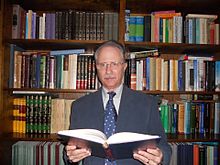Peter Benjamin Golden
Peter Benjamin Golden (* 1941) is Professor of History at Rutgers University .
Golden's research focuses on the Turkish nomads of medieval Eurasia, their interactions with Russia, Byzantium, the Caucasus and Islamic countries, Turkish philology, Hungarian proto-history, Caucasian studies and ethnogenesis. The main work of the polyglot scientist is the Introduction to the History of the Turkic Peoples (1992), which has also been translated into Turkish.
Awards
- Honorary member of the Türk Dil Kurumu (1989)
- Board of Trustees Award for Excellence in Research (1994)
- Provost's Award for Excellent Research (2005)
Memberships
- American Historical Association
- American Oriental Society
- Asian Studies Association
- Association for the Advancement of Central Asian Research
- Byzantine Studies Conference
- Central Asian Studies Association
- Early Slavic Studies Association
- Eurasian Linguistic Association
- Institute for Advanced Study
- Middle Eastern Studies Association
- Middle East Medievalists Association
- Mongolia Society
- National Endowment for the Humanities
- Society for Iranian Studies
- Society for the Study of Caucasia
- Turkish Studies Association
- Ukrainian Academy of Arts and Sciences in US
- World History Association
- World Turkology Association
Works
- Khazar Studies. An Historico-Philological Inquiry into the Origins of the Khazars ( Khazar Studies. A Historical-Philological Inquiry into the Origins of the Khazars), Bibliotheca Orientalis Hungarica, XXV, 1–2, Budapest: Akadémiai Kiadó, 1980, 2 volumes
- The Byzantine Greek Elements in the Rasûlid Hexaglot (Byzantine-Greek elements in the Rasulid vocabulary), Archivum Eurasiae Medii Aevi, V (1985), pp. 41-166
- An Introduction to the History of the Turkic Peoples: Ethnogenesis and State-Formation in Medieval and Early Modern Eurasia and the Middle East , (An Introduction to the History of the Turkish Peoples: Ethnogenesis and State Formation in Medieval and Early Modern Eurasia and the Middle East ), from the series: Turcologica , Vol. 9 (ed. Lars Johanson), Wiesbaden: Otto Harrassowitz Verlag, 1992
- The King's Dictionary. The Rasülid Hexaglot: Fourteenth-Century Vocabularies in Arabic, Persian, Turkic, Greek, Armenian and Mongolian (The King's Dictionary. The Rasulid Vocabulary: 14th Century Vocabulary in Arabic, Persian, Turkish, Greek, Armenian and Mongolian), edited with an introduction and commentary, translated by T. Halasi-Kun, PB Golden, L. Ligeti, Ö. Schütz, with essays by PB Golden and T.Th. Allsen, Leiden: Brill Publishers, 2000
- Türk Halkları Tarihine Giriş (An Introduction to the History of the Turkish Peoples), translated by Osman Karatay, Ankara: KaraM Yayınevi, 2002
- Nomads and their Neighbors in the Russian Steppe. Turks, Khazars and Qipchaqs (nomads and their neighbors in the Russian steppe. Turks, Khazars and Kipchaks ) in Variorum Collected Studies series, Aldershot: Ashgate Publishing, 2003
- Co-author with C. Zuckerman, A. Zajączkowski, Hazarlar ve Musevîlik (The Khazars and Judaism), edited by O. Karatay, Çorum: KaraM Yayınevi, 2005
Remarks
- ↑ He should speak the following Slavic languages: Russian, Ukrainian, Belarusian, Polish, Czech, Slovak, Serbo-Croatian, Bulgarian, as well as the Turkish languages Ottoman, Azerbaijani, Uzbek, Kipchak, Old and Middle Turkish and also Arabic, Persian, Georgian , Hungarian, Greek, Latin, French, Spanish and German
Web links
- Literature by and about Peter Benjamin Golden in the catalog of the German National Library
| personal data | |
|---|---|
| SURNAME | Golden, Peter Benjamin |
| BRIEF DESCRIPTION | American Turkologist, Professor of History at Rutgers University |
| DATE OF BIRTH | 1941 |
